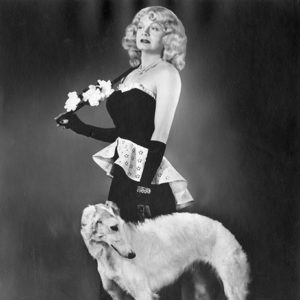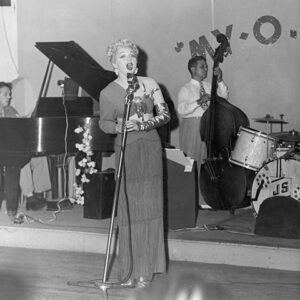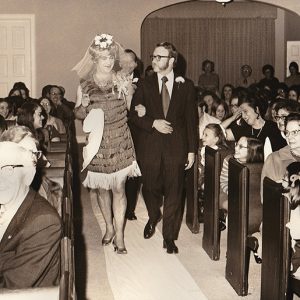calsfoundation@cals.org
Drag Shows
Arkansas has a long history of cross dressing, often called dressing in “drag.” Drag shows in the state have their roots in rural folk dramas often used as fundraisers for community institutions. Starting in the latter half of the twentieth century, drag in Arkansas became more professional in nature and is closely linked with LGBTQ+ communities across the state.
Before World War II, typical drag productions were staged as part of folk plays or farcical beauty contests. These were advertised as “womanless weddings” or “womanless beauty pageants” designed to serve as fundraisers for community institutions such as churches or schools. Of these, the womanless wedding was by far the favorite in many small towns and hamlets across Arkansas. The wedding would include a man—usually a burly, unshaven, large one—dressed as a bride intending to marry another man. In addition to the role of the bride, all traditionally female parts in the production were played by males.
In 1918, the tiny cotton town of Marked Tree (Poinsett County) staged a “womanless wedding” at a local Methodist church. The event was a benefit for the American Red Cross. The advertisement in the Marked Tree Tribune encouraged townspeople to “buy liberally of the tickets” and went on to say that the production would include a local judge, a college professor, and other well-known townsmen—surely to the delight of those in attendance. This aspect, the mocking of prominent locals against a recognizable backdrop, was a key component to rural folk dramas. Essentially, the play takes an everyday and highly familiar occurrence—a wedding—and mixes into it a great deal of cross dressing, resulting in an absurd and easily produced comedy. In August 1944, guards and other camp personnel staged a womanless wedding for the Japanese Americans interned at the Rohwer Relocation Center in southeast Arkansas. Photographs from the night’s show feature a large cast of camp officials staging a production for a packed house of interned Japanese Americans. According to the camp’s newspaper, the Rohwer Outpost, the production left the audience “rolling in the aisles.”
World War II brought drag out of the rural confines and began to display it for a wider audience in the state. Military-sponsored drag shows were popular both on and off base. Arkansas’s military bases of Camp Pike, Camp Joseph T. Robinson, and Camp Chaffee (now Fort Chaffee) all hosted military drag shows during World War II. According to camp newspapers, these shows were quite popular and were performed regularly. Officers and enlisted men at Arkansas encampments enjoyed shows such as “Queens of the Companies” and “The It Girls.” Though these shows were popular on base, they were hardly confined there. One military drag show, “This is the 66th,” headlined three nights at Robinson Center Music Hall in Little Rock (Pulaski County). The shows were intended to boost civilian morale.
After the war’s end, drag fell out of favor as a mainstream form of entertainment. During the decades to follow, drag gradually began to be seen as an expression of queer community, with gay bars hosting regular drag nights. The most notable of these clubs is the Discovery night club in Little Rock. Nestled in an otherwise abandoned industrial park along the Arkansas River, the Discovery club is owned and operated by Norman Jones. Jones is himself a famous drag queen in Arkansas and throughout the South. Jones won the first Miss Gay American Pageant in 1973. In 1975, Jones bought the rights to the lucrative pageant and brought the production to Little Rock. With this move, drag began to become more professional, more glitzy, and almost entirely divorced from its rural roots. Nevertheless, drag remains popular in gay bars and clubs across Arkansas, such as in Texarkana (Miller County), Fayetteville (Washington County), and Fort Smith (Sebastian County). Drag queens in Arkansas seek to master the craft as a profession and often tour the state with their acts while vying for pageant titles. However, older-style drag performances still occur in the state, as with the “Womanless Beauty Contest” fundraiser for the Franklin County Fair.
In 2021, drag queen Symone (a.k.a. Reggie Gavin) of Conway (Faulkner County), who earlier built a following at Discovery and Club Sway in Little Rock, was the winner of the thirteenth season of RuPaul’s Drag Race, a competition television program. Later that year, the Special Collections division of the University of Arkansas Libraries launched the Arkansas Drag Community Oral History Project to document the experiences of performers and the broader community.
On January 9, 2023, in the wake of a moral panic about transgender individuals and drag shows fostered by conservative activists nationwide, Republican state senators Gary Stubblefield of Branch (Franklin County) and Mary Bentley of Perryville (Perry County) filed SB43, a bill “to classify a drag performance as an adult-oriented business” on par with strip clubs or massage parlors, thus limiting places where such performances could occur, in addition to requiring that all audience members be adults. The bill was an example of model legislation (also known as a “cookie-cutter bill”) using language nearly identical to bills Republicans had already introduced in Arizona, Missouri, Texas, and Tennessee (with other states soon following). SB43 defined a drag performance as one in which an individual “exhibits a gender identity that is different from the performer’s gender assigned at birth” and “performs before an audience of at least two (2) persons for entertainment, whether performed for payment or not” in a manner “intended to appeal to the prurient interest.” The bill passed out of committee unanimously on voice vote on January 19, 2023, and passed the whole Senate on January 24, 2023, with Republicans voting unanimously for it and all Democrats voting against. The bill passed out of the House committee on February 1, 2023. However, prior to a full vote in the House, the bill was heavily amended, removing all reference to drag performances and gender identity; the version that passed the House on February 6, 2023, instead made it illegal for minors to attend an “adult-oriented performance,” or one in which breasts or genitalia are exposed or sexual activity is depicted. Governor Sarah Huckabee Sanders signed this bill into law on February 24, 2023.
In May 2023, the nonprofit group Northwest Arkansas (NWA) Equality released a statement that announced that all official Northwest Arkansas (NWA) Pride events would be pulled from the Walton Arts Center (WAC) in Fayetteville because the center had called off what it referred to as “drag performances by adults specifically for minors.” A spokesperson for center said that the decision had been due to safety concerns and “divisive political rhetoric at this time.” It was reported, however, that the Walton Arts Center’s board had not held a vote to restrict the performances. The director of NWA Pride announced that the Pride celebration would move forward amid overwhelming community support, with programming moving to other locations. Nine members of the WAC board and at least one employee resigned in protest of the center’s decision.
For additional information:
“Ad Personnel Present Play, Womanless Wedding.” Rohwer Outpost, August 19, 1944.
Arkansas Drag Community Oral History Project. https://robertslibrary.org/dragoralhistory/ (accessed February 14, 2023).
Bailey, Austin. “Lawmakers Go after Drag Shows as Arkansas’s Culture War Rages On.” Arkansas Times, January 19, 2023. https://arktimes.com/arkansas-blog/2023/01/19/lawmakers-go-after-drag-shows-as-arkansass-culture-war-rages-on (accessed January 20, 2023).
“Circus Daze.” Camp Robinson News, February 2, 1945.
Eichkorn, Paige. “Miss Gay America Pageant Concludes.” Arkansas Democrat-Gazette, January 21, 2023, pp. 1B, 3B. Online at https://www.arkansasonline.com/news/2023/jan/21/dc-contestant-crowned-miss-gay-america-in-arkansas-as-states-drag-legislation-advances/ (accessed January 23, 2023).
Harvey Goodwin Collection. University of Arkansas at Little Rock Archives, Little Rock, Arkansas.
Hennigan, Mary. “NWA Pride Pulls Programming from Walton Arts Center after Decision to Restrict Drag.” Arkansas Times, May 15, 2023. https://arktimes.com/arkansas-blog/2023/05/10/nwa-pride-pulls-programming-from-walton-arts-center-after-decision-to-restrict-drag#hyvor-talk-view (accessed May 15, 2023).
Lancaster, Grant. “Sanders Signs Bill on Adult Performances.” Arkansas Democrat-Gazette, February 26, 2023, p. 4B. Online at https://www.arkansasonline.com/news/2023/feb/26/sanders-signs-bill-targeting-adult-performances/ (accessed February 27, 2023).
Langhorne, Will. “‘Adult Performance’ Bill OK’d.” Arkansas Democrat-Gazette, February 22, 2023, pp. 1B, 2B. Online at https://www.arkansasonline.com/news/2023/feb/22/senate-committee-endorses-adult-oriented/ (accessed February 22, 2023).
———. “House Approves Reworked SB43.” Arkansas Democrat-Gazette, February 7, 2023, pp. 1A, 5A. Online at https://www.arkansasonline.com/news/2023/feb/07/arkansas-house-approves-bill-that-would-restrict/ (accessed February 7, 2023).
———. “House Panel Approves Bill Aimed at Drag Shows.” Arkansas Democrat-Gazette, February 2, 2023, pp. 1A, 3A. Online at https://www.arkansasonline.com/news/2023/feb/02/bill-defining-adult-oriented-performance-passes/ (accessed February 2, 2023).
Langhorne, Will, and Daniel McFadin. “‘Drag’ Performer Restriction Clears Senate Panel.” Arkansas Democrat-Gazette, January 20, 2023, pp. 1A, 4A. Online at https://www.arkansasonline.com/news/2023/jan/20/bill-defining-drag-performance-as-adult-oriented/ (accessed January 20, 2023).
Newton, Esther. Mother Camp: Female Impersonators in America. Chicago: University of Chicago Press, 1972.
Noland, Ali. “Drag Is Protected Speech and SB43 Is Unconstitutional.” Arkansas Times, February 1, 2023. https://arktimes.com/arkansas-blog/2023/02/01/drag-is-protected-speech-and-sb43-is-unconstitutional (accessed February 1, 2023).
Smittle, Stephanie. “‘This Is Drag.'” Arkansas Times, February 2021, pp. 64–67. Online at https://arktimes.com/entertainment/2021/01/29/all-hail-queen-symone-the-conway-ark-queen-owning-the-runway-on-rupauls-drag-race (accessed April 30, 2021).
“Solider-Actor Trying on Dress for Part in Play, Wows’em in Shop” Covered Wagon (Camp Pike), August 8, 1941.
Teeman, Tim. “Arkansas Drag Ban is the Cover for Bigger Anti-LGBTQ Attack, Activists Say.” The Daily Beast, January 29, 2023. https://www.thedailybeast.com/arkansas-drag-ban-is-the-cover-for-bigger-anti-lgbtq-attack-activists-say (accessed February 1, 2023).
Thompson, Brock. The Un-Natural State: Arkansas and the Queer South. Fayetteville: University of Arkansas Press, 2010.
Vrbin, Tess. “Anti-Drag Bill Passes Arkansas Senate Committee, Opponents Rally outside Capitol.” Arkansas Advocate, January 19, 2023. https://arkansasadvocate.com/2023/01/19/anti-drag-bill-passes-arkansas-senate-committee-opponents-rally-outside-capitol/ (accessed January 20, 2023).
“Wedding Play a Comedy Hit.” Rohwer Outpost, August 26, 1944.
Wickline, Michael R. “Senate Approves Bill Defining, Limiting ‘Drag Performances.'” Arkansas Democrat-Gazette, January 25, 2023, pp. 1A, 4A. Online at https://www.arkansasonline.com/news/2023/jan/25/arkansas-senate-approves-drag-performance-bill/ (accessed January 25, 2023).
“Womanless Wedding.” Marked Tree Tribune, May 3, 1918.
Brock Thompson
The Library of Congress
 Harvey Goodwin
Harvey Goodwin  Harvey Goodwin
Harvey Goodwin  Harvey Goodwin
Harvey Goodwin  Womanless Wedding
Womanless Wedding 




Comments
No comments on this entry yet.